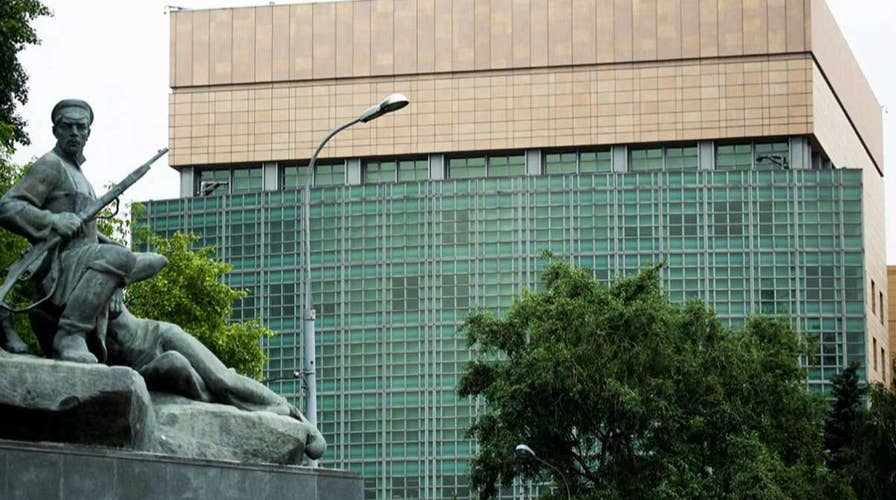Russia orders reduction of US diplomats, seizes facilities
Action comes as new sanctions bill heads to President Trump's desk
Russian President Vladimir Putin finally took his revenge on Friday, responding to a months-old censure from the Obama administration and new Congressional sanctions by closing down several American facilities in Russia and ordering a reduction in the number of U.S. diplomats allowed in the country.
Following the U.S. Senate's approval on Thursday of fresh, sweeping sanctions against Russia, the country's Foreign Ministry ordered a reduction in the number of U.S. diplomats in Russia by Sept. 1 and said it was closing down a U.S. recreation retreat outside Moscow as well as warehouse facilities.
The Kremlin said the number of U.S. diplomats was being cut to 455, however, it wasn't immediately clear how many U.S. diplomats currently serve in Russia, thus it's not known how big of a reduction Putin actually ordered.
The new Russian Ambassador, Vassily Nebenzia, told Fox News on Friday that Putin felt it was finally time to respond to the United States.
"It was a reaction, which was delayed for very considerable time, for half a year in the hope the current administration wouldn’t do the damage the Obama administration did," Nebenzia said. "We’ve been robbed of our own compounds here, absolutely illegally, and our diplomats were sent out.
"In diplomacy you know there is real reciprocity, which is sometimes is nicknamed tit-for-tat, and we’ve been restrained and calm and polite long enough. And we were warning our American counterparts that we would be obliged to do so if there is no progress on that issue, and there is no progress on that issue. The time has come that we had to do it."
Congress' package of stiff financial sanctions, which also punished Iran and North Korea, still needs to be signed by President Trump, which is no sure bet. The legislation bars Trump from easing or waiving the penalties on Russia unless Congress agrees.
However, even if Trump were to veto the sanctions, it's likely Congress could override the president and push the package through. The Senate passed the bill, 98-2, two days after the House approved the measure by an overwhelming margin, 419-3.
The legislation is aimed at punishing Moscow for its alleged role in meddling in the 2016 U.S. presidential election and for the Kremlin's military aggression in Ukraine and Syria, where the Putin's intervention has helped prop up the beleaguered government of President Bashar Assad.

U.S. Sen. John McCain, R-Ariz., chairs a Senate Armed Services Committee meeting in Washington, July 11, 2017. (Associated Press)
Russia's Foreign Ministry dismissed the new sanctions as "creating unfair competitive advantages for the U.S. economy."
"This kind of blackmail aimed at restricting the cooperation between Russia and other nations is a threat for many countries and global businesses," the statement said.
The 184-page bill seeks to hit Putin and the oligarchs close to him by targeting Russian corruption, human rights abusers and crucial sectors of the Russian economy, including weapons sales and energy exports.
The bill underwent revisions to address concerns voiced by American oil and natural gas companies, who argued that sanctions specific to Russia's energy sector could backfire on them, and work to Moscow's benefit. The bill raised the threshold for when U.S. firms would be prohibited from being part of energy projects that also included Russian businesses.
Lawmakers said they also made adjustments so the sanctions on Russia's energy sector didn't undercut the ability of U.S. allies in Europe to get access to oil and gas resources outside of Russia.
Russia's response to the sanctions mirrors moves made by outgoing President Barack Obama last December to expel 35 Russian diplomats and shut down two Russian estates in the U.S. as punishment for alleged election meddling. At the time, with a new president set to take over, Putin said he would not immediately retaliate, wanting to see if relations improved under Trump.
But Trump hasn't moved to undo Obama's expulsions and closings, and with Congress acting on additional punitive measures, Moscow acted. The Kremlin said it would cut the U.S. diplomatic corps even further if the U.S. decided to expel more Russian diplomats to continue the tit-for-tat.
The Kremlin had previously said that it would not impose any sanctions on the U.S. until and if Trump signed the sanctions bill.
Fox News' Ben Evansky and The Associated Press contributed reporting to this story.





















